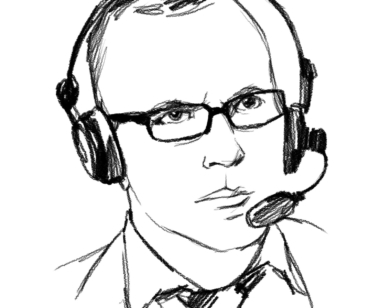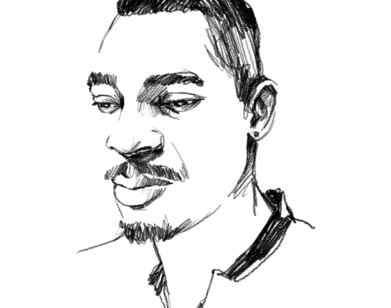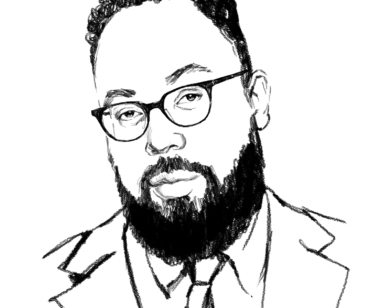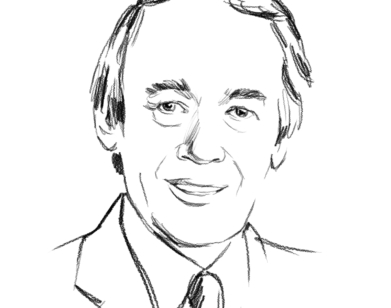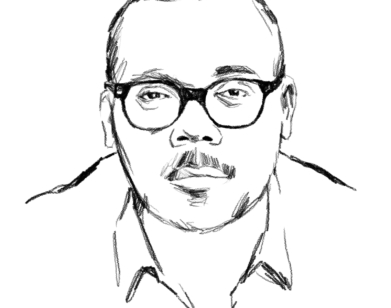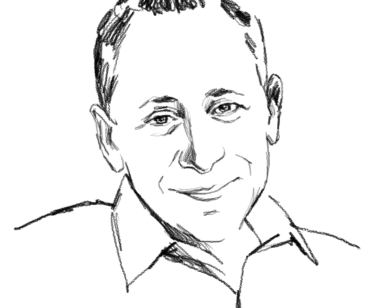Ask a Sane Person: Daniel Mendelsohn on “The New 1930s” and Schitt’s Creek
Daniel Mendelsohn’s field of expertise extends from pop culture to the ancient classics, all covered with a sword-sharp critical eye and a poet’s love of language. He writes regularly for The New Yorker and The New York Review of Books, and his latest book, a masterful hybrid of memoir, criticism, biography, and fiction titled Three Rings: A Tale of Exile, Narrative, and Fate, is out from University of Virginia Press in September.
———
INTERVIEW: Where are you and how long have you been isolating?
DANIEL MENDELSOHN: I’m at home in the Hudson Valley, near the campus of Bard College, where I teach. I’ve been isolating here since March 10, which is when I heard that someone I know up here had COVID. Although my contact with him was secondary, it seemed like a good idea to quarantine, and I’ve been isolating ever since. In early April I was joined by my fabulous niece Natasha, who’s a junior at Northeastern. Apart from being a great person to watch Schitt’s Creek with, she’s a world-class cook and patissière, so at least we’ve been eating very well.
INTERVIEW: What has this pandemic altered about your view of society?
MENDELSOHN: Very little. If you read Thucydides, who harrowingly describes the social effects of the plague that struck Athens during the Peloponnesian War in the 5th century BCE, or Boccaccio’s The Decameron, with its hair-raising description of how Florentine society collapsed during the Black Death in the 14th century, you know that people’s behavior during epidemics tends to be depressingly similar, whatever the culture or era: social norms and civil behavior begin to crumble under the pressure of fear. I think the only thing that has prevented that collapse from happening more swiftly right now is the fact that we’re required to shelter at home—which means that, up till now, certain kinds of mischief and violence have been impossible. But recently there have been stories about armed militias protecting storeowners who want to reopen despite the lockdown, and so forth. I think it’s going to get uglier.
INTERVIEW: What is the worst-case scenario for the future?
MENDELSOHN: Epidemiologically, that people won’t be able to tolerate the lockdown much longer (this is already happening, of course) and there will be a huge resurgence in infections and deaths in the coming months, which will further delay the resumption of some kind of normalcy (whatever that means). I see this as almost inevitable, given that there’s been no intelligent, coherent national policy from the start—so even states that have been successfully flattening the curve will be vulnerable because other states are prematurely reopening. My primary political concern is that the pandemic will furnish a pretext for tampering with the general election in November.
INTERVIEW: What good can come out of this lockdown? Are there any reasons to hope?
MENDELSOHN: I think whatever good can come from it is on the personal level. Being required to shelter at home, being deprived of the busy-ness that characterizes most of our lives—the socializing, the shopping, the gym, etc.—will, one can only hope, force people to reassess their values.
INTERVIEW: Do you predict an outcome of a more inclusive globalism or more nationalism and isolationism?
MENDELSOHN: I think there’s going to be more nationalism and isolationism—it’s already happening. Look at the U.S., which has just extended closure of our borders in order to “keep us safe”—an utterly idiotic move that has no scientific basis and whose value is purely as PR to shore up xenophobic politics.
INTERVIEW: More socialism or more authoritarianism?
MENDELSOHN: Authoritarianism. Even before COVID, I think we were moving toward a “new 1930s,” as I kept thinking of it: a marked rise, throughout the world, in the appeal of demagogues in democratic nations, and the fragmenting of longstanding global political arrangements. Now, with the addition of mass panic and what looks like the advent of an economic cataclysm on the order of the Great Depression, the ingredients are all in place for a serious resurgence of unfettered authoritarianism everywhere. When people are afraid and jobless, they start looking for someone to blame, and that’s when the authoritarian types move into power. I’m not optimistic.
INTERVIEW: What has been your daily routine during this time?
MENDELSOHN: Since I’m a writer, my routine hasn’t actually been all that different during the pandemic from what it was before. I get up with the birds—around 5 or 5:30. I read for pleasure for a few hours: right now, The Golden Bowl, and ten pages of Saint-Simon every day, however boring the battle scenes may be. Around 8 I stir, do my morning workout, have breakfast, and then have my morning session of work, which lasts until lunchtime at around 1 or so. I like to write in the mornings, so that’s when I work on whatever articles or essays I’m doing; I just finished a long one for the Times Book Review and I’m working on another for The New York Review of Books. After lunch, until around 5:30 or so, I work on the new translation of the Odyssey that I’m doing. At around 5, I spend an hour or so translating a few passages of The Decameron, which I then tweet as part of my #DecameronCorona project—it’s been really fun focusing on that text and doing a line-by-line translation and informal commentary. (Fun, because I’m not a Boccaccio scholar and have no dog in that race; it’s just for me, and it’s good to have something new and unfamiliar to occupy my brain.) Then around 6:30, I go for a mile-and-a-half walk around the little hamlet where I live with my niece and my neighbors Christine and Paula. Then Tasha and I have dinner and then we watch TV. I’m usually in bed by 10 or 10.30, at which point I read for a couple of hours more.
INTERVIEW: Describe the current state of your hair?
MENDELSOHN: Shaved, as usual. I’m among the lucky few whose coiffure has been utterly unaffected by the lockdown. I did give a friend a haircut last week and I have to say I’m glad I’ve been shaving my head since 1994.
INTERVIEW: On a scale of 1 to 10, what level is your level of panic about the current state of the world?
MENDELSOHN: On a good day, around 7. Most days closer to 9. It would be hard enough to manage the anxiety, between the pandemic and the economy, but given that we have the stupidest, wickedest, and most incompetent people leading the government at present, it’s unbearable.
INTERVIEW: What is your ultimate novel, film, and album for self-isolation?
MENDELSOHN: I don’t have one, and I always resist the idea that there are special texts for special moments. (With the possible exception of break-up songs.) I think any work that’s stimulating to the imagination and expanding for the mind and soul is going to be helpful in self-isolation. Read Jane Austen, read Richard Powers, listen to R.E.M.’s Green or Gesualdo’s madrigals, watch Broadchurch or Friday Night Lights or Russian Ark—whatever floats your boat and reminds you what being a human being is supposed to be about. What I avoid like the plague (sorry!) is anything having to do with pandemics. We live in a culture of endless and mostly unnecessary commentary and opinionating—a habit that has been feasting on the pandemic from the start.
INTERVIEW: Who would be your nightmare person to spend a month of lockdown with?
MENDELSOHN: Anyone except Natasha, my niece.
INTERVIEW: What thinkers have you taken comfort in of late and why?
MENDELSOHN: Again, nobody special. In a climate when non-thinking, or even anti-thinking, has become the rule at the highest levels, anyone who has interesting things to say—whether it’s Henry James or Hannah Arendt or Marlene Dietrich—is comforting. (I just rewatched Maximilian Schell’s fabulous documentary about Dietrich, which is one of the best things ever made about the hollowness of celebrity.)
INTERVIEW: If 2020 were a song, which song would it be?
MENDELSOHN: The “Dies Irae” from Verdi’s Requiem.
INTERVIEW: Where did we go wrong? Like, what was the exact moment?
MENDELSOHN: The election of Ronald Reagan in 1980 gave, to my mind, a significant push to the irreversible decline in which we now find ourselves—it marked the apotheosis of a persistent strain of magical thinking in American politics. The 1980 election was a choice between a slick and intellectually inert charmer who spewed happy talk, on the one hand, and an unglamorous peanut farmer who wanted to talk about “malaise,” on the other: we chose the happy talk—surprise, surprise—and have been choosing it ever since. Our current political crisis is the reductio ad absurdum of that choice: the fantasy that government is “the problem” and must be dismantled whenever possible (that’s certainly working out right now!), the contempt for institutions, the elevation of ideological fantasy above science and expertise.
INTERVIEW: Which (admittedly totally unqualified) celebrity would you trust with the planet’s future?
MENDELSOHN: All celebrities are, ipso facto, unqualified.
INTERVIEW: If you could stop time at one particular moment in your life, which moment would it be?
MENDELSOHN: New Year’s Eve 1981, a carpeted floor in a room in a house in a suburb of Washington, DC. That’s all I’m saying.
INTERVIEW: What’s one skill we should all learn while in quarantine?
MENDELSOHN: The ability to remain silent when you have nothing to say.
INTERVIEW: State vs. federal? Who should have the power to control the movements and reopening of economies for its people?
MENDELSOHN: Well, it’s not for me to decide who should have the power: we do still have a Constitution, the last time I checked. That said, I think we’re in an 1850s moment: the stress fractures that have existed in this country from the start, and which, also from the start, we have chosen to pretend aren’t there (see above under “Magical Thinking”), are starting to gape again. I’ve been following with great interest the movement toward state and regional blocs as a means of filling the vacuum that’s been created by the abdication of responsible and intelligent action on the part of the federal government. I think it will have a beneficial effect in the short run—somebody has to act crisply and intelligently—but what it means in the long-term for the Union is troubling. But then, few democracies or democratic republics in world history have survived longer than a couple of centuries; why should ours be different?
INTERVIEW: What prevents you from giving up hope in the human race?
MENDELSOHN: Nothing. I wrote a book about the Holocaust. I have no illusions about the human race.


